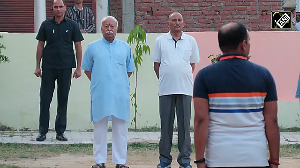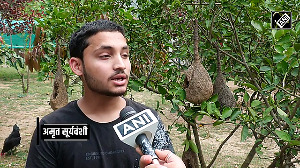Named Thyagaraja Sundaram at birth after the presiding deity of Thiruvaiyaru, known as a culture-centre in the Cauvery delta of the yore, Murasoli Maran -- who died in Chennai on Sunday -- was drawn to his maternal uncle, Dhakshinamurthy, better known as Muthuvel Karunanidhi, the later-day chief minister of Tamil Nadu and one of the shrewdest political brains in contemporary India.
His mother Shanmugasundarathamma's younger brother Karunanidhi's penchant for Tamil prose and 'rationalist' views attracted young Maran right from his school days.
While Karunanidhi dropped out of school to become a full-time activist of the Dravidar Kazhagam founded by the rationalist leader, the late 'Periyar' E V Ramaswamy Naicker, Maran, like other second-generation leaders of the movement, went on to do his post-graduation. He did his MA in the Pachaiyappa College, Chennai.
The college was then considered a hotbed of 'Dravidian politics', given its long association with the 'non-Brahmin' Justice Party, considered the precursor to the anti-Brahmin rationalist movement.
Once the late C N Annadurai walked out of Dravidar Kazhagam and formed the political outfit, Dravida Munnetra Kazhagam over an aged 'Periyar' marrying a young Maniyammai in 1949, and Karunanidhi too joined the new party after some hesitation, Thyagaraja Sundaram was by his side.
And when Karunanidhi moved over to Chennai as a full-time politician, steadily shedding his early innings as a path-breaking scriptwriter of Tamil cinema, replacing historic and puranic musicals with social melodramas, young Maran was not far behind.
Starting from the age of 20, Maran began scripting films, among them being Needhipathi and Kula-Deiyvam. For thespian 'Sivaji' Ganesan, he penned Annaiyin Aanai, while with the late M G Ramachadran he produced Engal Thangam in the early seventies.
The 'rationalist' Maran took a dig at superstitions in a punning Hari-katha that he penned for MGR in the movie, drawing a parallel with American Armstrong's landing on the moon.
That was also Maran's last direct links with the filmdom, until his United States-educated son Kalanidhi entered video and later television in a big way, making his Sun TV group a household name in the Tamil-speaking world. But for Maran in the seventies, his politics made him busier by the day, and the emerging differences between Karunanidhi and MGR led to the latter launching the Anna Dravida Munnetra Kazhagam, which later adapted the prefix 'All India' during the Emergency.
From then on till death, Maran was Karunanidhi's eyes and ears, particularly at 'distant Delhi', when the national political scenario began taking a regional tone and texture.
Rarely was he heard in public. In news conferences that Karunanidhi addressed for over two decades until he himself shifted base to Delhi for good under the Vajpayee government, Maran was a permanent presence on the right hand side of his uncle, clarifying points, and translating English questions for him, without being heard.
Yet at times in the last few years, Maran was also seen as Karunanidhi's 'mouth' at times, taking direct-hits at non-performing DMK ministers and inefficient MLAs at party forums when his uncle was chief minister for five years from 1996.
While this made him unpopular with the second-line party leaders, Maran was proved right at the hustings, when the DMK lost badly to the AIADMK in last year's assembly polls.
But never ever was Maran heard in the public, other than while campaigning for his own elections -- and occasionally for select party men, thus making him a 'withdrawn and unapproachable' leader for the DMK cadres.
But that was an image that Maran seemed to have carefully cultivated over time, if only not to rub the party second-line on the wrong aside, or cause concern for Karunanidhi's politician-son M K Stalin, who was being groomed as the heir-apparent.
In later years, rumours over such differences became unavoidable, given the perceptible distinctions between the two.
While Maran was a backroom boy for the party, negotiating alliances and predicting the future scenario, Stalin was a home-grown, grassroots-level politician, who counted more on cadres and allies, and for obvious reasons.
At one stage during the run-up to the assembly polls last year, Maran issued a statement through the national news agencies, distancing himself from the party line.
It was the Tamil New Year's day, and Karunanidhi was to launch the DMK poll campaign that very evening. Though Maran was talked into returning to the mainstream, his seeming prediction came true.
Maran felt frustrated and cheated at his efforts to rope in the breakaway MDMK going waste, but in the end, he proved prophetic.
The caste-based alliance cobbled together by Karunanidhi, with Stalin's political future alone in mind, failed to pass muster.
Though Maran became more involved in the party affairs after the electoral defeat, his ministerial duties at the Centre, and his failing health often came in the way for him to make the kind of cerebral contribution that had turned around the DMK during the 13-year-long 'vanvas' when MGR was in power.
For all the descriptions that Maran was the DMK ideologue, he was more of a strategist and a political realist.
Ideology was a second nature to him, but he did not confuse his own priorities. His concept was to have the DMK rule Tamil Nadu.
If it required his donning a ministerial mantle at Delhi, he was only happy to do that.
Given the perceived paucity of talent in the party, and given his own greater access to national leaders, it was but natural for H D Deve Gowda and I K Gujral, first, and Vajpayee, later, to have him head important economic ministries like industry and commerce.
It was value-addition, not just at the political-level for the respective prime ministers, but also at the administrative-level, that too at a time, poor talent had become the hallmarks of coalition governments at the Centre.
From the day he took over as editor of Murasoli (meaning the sound of the drum), the daily founded by Karunanidhi after the latter became a minister in the first DMK ministry under Annadurai through the historic 1967 elections, Maran walked only a step behind the party chief.
It was possibly thus, he contested and won the prestigious South Madras parliamentary constituency when Annadurai vacated his seat to become chief minister.
With DMK veterans like K Rajaram and the late 'Nanjil' K Manoharan drawn towards ministerial berths at the state-level, Maran became the party's standing-post in Delhi, particularly when Karunanidhi succeeded Annadurai and wanted a confidant in the national capital.
It suited both the party and its preceptor, their own demands of the time, particularly Maran's withdrawn nature.
It was thus that Maran possibly escaped the wrath of enquiry commissions and police actions that haunted former DMK ministers in the state, be it at the instance of MGR or Jayalalithaa.
It may thus surprise many to note that for an efficient politician of his calibre, Maran had never held a ministerial post in the state, nor had he been a state legislator. It was in the V P Singh's Janata Dal-National Front government that he first held any official position, becoming the urban development minister.
That way, Tamil Nadu reacted with surprise when the 'less active' Maran took seriously ill only months before the assembly polls of 2001, needing weeks of hospitalisation and a series of medication, unheard of even to the medical profession in Chennai, India's very own 'Mecca of Medicare.'
The surprise then turned into shock when Maran was seen arguing heatedly with cops of the Jayalalithaa government, and being literally bundled out of the car in which Karunanidhi was being taken after a controversial midnight arrest on June 30 that very year.
It was unprecedented in the annals of democratic India, that a minister of the Union government was thus being manhandled by cops.
The seeds of the controversy surrounding Karnataka Chief Minister S M Krishna defying the prime minister, not to mention the Supreme Court, may have been sown there.
Yet at the end of a full year, when Maran was again in hospital in Chennai after a heart surgery performed at a Delhi hospital in the interregnum had gone wrong, it was only Karunanidhi who seemed to remember it.
Addressing party men at the annual 'Mup-perum Vizha' of the DMK, to celebrate the birth anniversaries of Annadurai, Periyar and the 'Murasoli', which again had been postponed for Maran to return from an official foreign tour, Karunanidhi's eyes welled with tears in public as he recalled the incident.
That way, the loss to Karunanidhi, who is seen as the 'uncrowned king' of political strategy in contemporary Tamil Nadu is as much political as personal.
It was during her first term as chief minister after trouncing the DMK so very completely since its electoral entry in the 1957 elections that Jayalalithaa said a Brahmin like her heading the Dravidian AIADMK was the last stage in the 'evolution of the rationalist movement.' But Maran did one better.
He took the 'anti-god', 'anti-Brahmin' and 'anti-North' DMK with its rationalist ideology closer to the 'Hindutva' BJP under the most trying of times for both parties at the national level.
What more, he also retained the confidence of the DMK at home and the BJP and Prime Minister Atal Bihari Vajpayee at the Centre, with the result, neither his parent party, nor did the National Democratic Alliance host, even think twice before leaving two important economic ministries to his care.
And throughout his term as minister, not once did his prime minister, nor the Sangh Parivar ever demand his removal, even while talking against divestment and a review of the industrialisation policy, both of which concerned him to some extent.stead, they were only targeting their own Bharatiya Janata Party ministers like Arun Shourie, if not the prime minister himself.






 © 2025
© 2025